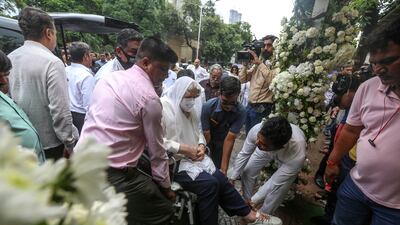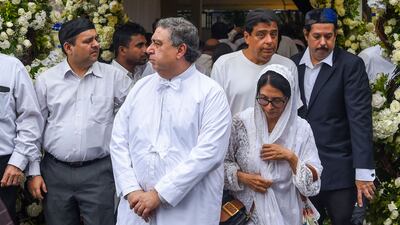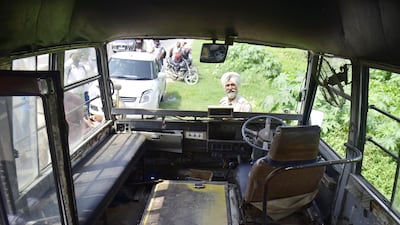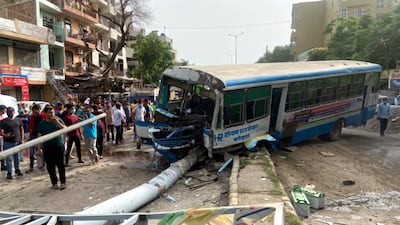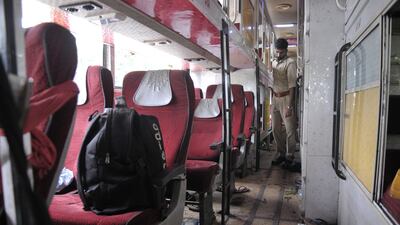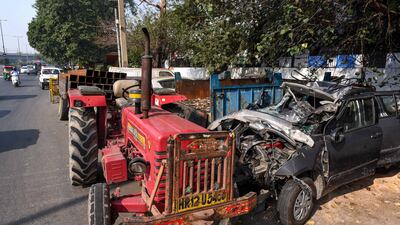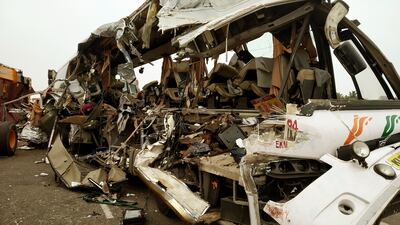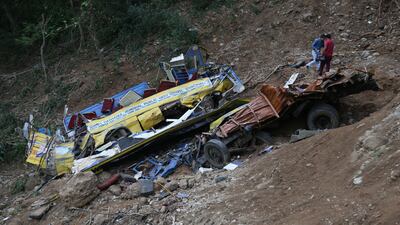The death of former Tata Sons boss Cyrus Mistry has put the spotlight on India's dismal road safety record and triggered an appeal for passengers to wear seat belts.
The accident on Sunday afternoon killed Mr Mistry, 54, and friend Jehangir Pandole, who were in the back seat of a Mercedes sedan.
The driver, leading gynaecologist Dr Anahita Pandole, and her husband Darius Pandole, in the front seats, were critically injured when the car slammed into a concrete barrier of a bridge about 100 kilometres outside Mumbai.
A police report said speeding caused the accident and that both passengers in the rear were not buckled up.
founder of SaveLIFE Foundation
The death of the billionaire businessman, whose family founded the construction group Shapoorji Pallonji, has stirred industry figures to pledge to rear seat belts.
India has a law that mandates all passengers to use seat belts — but many don't adhere to it.
Police can issue a fine of 1,000 rupees (Dh46/$12) to passengers not buckled up in the front but they do not tend to check passengers in the back.
India has just 1 per cent of the world's road vehicles but accounts for 11 per cent of global deaths from road accidents.
Dangers of failing to buckle up
Piyush Tewari, the founder of the SaveLIFE Foundation investigating the crash, said enforcement of traffic law and safety awareness is key.
“It’s unfortunate that it took such a tragic incident for the country to start focusing on the issue of road safety which otherwise kills 155,000 people each year or about 426 people every day,” Mr Tewari told The National.
“What caused the crash was a combination of over speeding that led to loss of control and interaction with an exposed concrete structure leading to a very serious crash taking place at a high speed.
“What led to deaths and injuries was the fact that the seat belts were not used by rear passengers.”
The non-government organisation conducts forensic investigations into road accidents for police across the country.
On Sunday, its team examined the accident involving Mr Mistry.
The speed limit on the bridge was 40 kph but few on highways and roads adhere to speed limits.
Mr Tewari spelt out the dangers of not buckling up at the back.
“If you are not belted at the back, the curtain airbag along the window is not going to save the passenger. The first thing that will happen is that their head will hit the roof — and the roof has no air bags,” he said.
“After that, their head will hit the front passenger who is also moving forward.
“Then they will move and front load the seat, as we call it, which will cause spinal injuries and fractures to the front seat passengers.”
Among the world's deadliest roads
Investigations carried out by SaveLIFE on Indian highways show that 30 per cent of fatalities were due to passengers not wearing seat belts in the back seats.
A 2019 survey conducted by the group covering more than 6,000 people in 11 Indian cities found only 7 per cent said they used the rear seat belt and only 27 per cent were aware of the law on seat-belt wearing in the back seats of cars.
As many as 91 per cent of people said they had never been stopped by police for not using rear seat belts.
The use of rear seat belts can prevent death by 25 per cent and injury by 75 per cent, according to the World Health Organisation.
Road traffic injuries claim more than 1.35 million lives each year globally, with the number of deaths high among low and middle-income countries.
Grim statistics from India reinforce the global fatality rate.

The World Bank last year said that although India had one per cent of the world’s vehicles, it accounted for 11 per cent of all road crash deaths, 53 road crashes every hour, and the death of one person every four minutes.
The country has the highest crash severity rate in the world, or the highest number of deaths per 100 crashes.
“India has 38 deaths per 100 crashes which is much more than what you might have in the US, Europe and among the other developing countries, so we definitely have deadlier roads than anywhere else in the world,” Mr Tewari said.
“More people are killed per 100 crashes than anywhere else in the world so that unfortunately pegs us at the very top when it comes to severity of road crashes.”
He said efforts were continuing to work with authorities to identify high fatality areas and reduce deaths using road engineering design, police enforcement, improved trauma care and user engagement.
Safety messaging that the lives of passengers in the back seats are as important as those in the front and rear seat belt reminders for all cars, not just luxury cars, will be important going forward.
His team of six forensic scientists and engineers have examined tread marks, pools of oil and blood at the site and will correlate injuries of the victims with a study of the car interior.
Road safety pledges
On Tuesday, hundreds attended the cremation of Mr Mistry in Mumbai.
Industry heads and friends of Mr Mistry have trained the spotlight on road safety.
Billionaire businessman Anand Mahindra said Mr Mistry was “destined for greatness” if his life had not snatched away.
“I resolve to always wear my seat belt even when in the rear seat of the car. And I urge all of you to take that pledge too. We all owe it to our families,” he said on Twitter.
Experts worry these are knee-jerk reactions.
Ashish Verma, a professor and convener of the Indian Institute of Sciences Sustainable Transportation Lab, said safety on all roads and not just national highways was essential.
“We are always reactive, not proactive, that is the problem,” he said.
“A major overhaul is required. We concentrate on engineering aspects of highways but we are not doing enough on the human aspect.
“There must be education and systematic improvement in the driver licensing.
“Drivers should not just be taught to manoeuvre vehicles, we must create licensed drivers who are safe. That remains a big element.”


